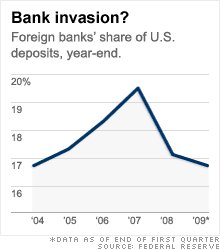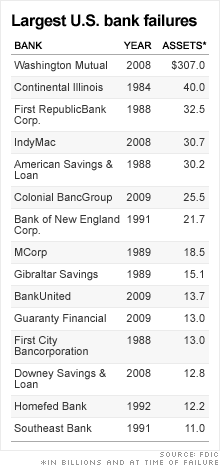Foreign banks can't save everyone
A big Spanish bank bought the remains of failed Texas thrift Guaranty. But most overseas giants have their own problems.


NEW YORK (Fortune) -- Foreign banks are starting to nibble at America's failed-bank buffet. But don't expect them to clean it out.
Spain's Banco Bilbao Vizcaya Argentaria (BBV) has emerged as the winning bidder for the remains of Texas thrift Guaranty Financial Group (GFG).
Guaranty was seized by federal regulators late Friday. With $13 billion in assets, Guaranty is the third-biggest bank failure of 2009 and tied for the 11th-largest ever.
The arrangement makes BBVA the first overseas-based bank to buy a troubled institution this year from the Federal Deposit Insurance Corp. It may not be the last, given that dozens of additional failures are expected over the next year.
Even so, a big wave of foreign bank investments probably isn't on the horizon, given the problems most of those institutions are dealing with at home and the poor results many have reported on previous forays into the U.S. market.
"The Europeans are suffering from the same problems as we are," said Robert DeYoung, a finance professor at the University of Kansas business school. "Everyone is trying to recapitalize, which means less money for expansion."
BBVA is based in the northern Spanish port city of Bilbao, but it already operates the fourth-biggest banking chain in Texas, by deposits, following a series of Lone Star state acquisitions at mid-decade. BBVA followed up those deals with the acquisition of Alabama-based Compass Bancshares in 2007 for $9.1 billion.
Guaranty, which operates more than 150 branches in Texas and California, would fit in perfectly with BBVA's so-called retail footprint -- a factor that DeYoung says is one of the leading drivers of bankers' decision making.
"Geography matters a lot in banking, because acquiring retail deposits is a cheap way to grow," he said. "A lot of these banks have niche markets, and this is a way to add to that."
BBVA isn't the only foreign bank dipping a toe in the failed bank waters. The TD Bank unit of Toronto Dominion (TD) bid in May for failed Florida thrift BankUnited but lost out to a private equity group led by former NorthFork Bank chief John Kanas.
A number of other big foreign banks have significant U.S. operations. BBVA's Spanish rival Santander (STD) bought Pennsylvania's Sovereign Bank this year, and Britain's HSBC (HBC) owns more than 400 branches, mostly in New York.
But while the big foreign banks clearly have the scale to handle acquisitions, their impact probably will be muted by their own problems and the mixed results of earlier investments here.
In Spain, for instance, unemployment is running well into the double digits and house prices are falling. While Spanish banks have been lauded for their conservative loan loss reserve policies, further declines in property prices -- and defaults by property developers who have been big borrowers -- could expose the likes of Santander and BBVA to damaging losses.
Meanwhile, foreign owners of U.S. banks haven't been universally pleased with the returns their investments have brought in. Royal Bank of Canada (RY), which operates 442 branches in the Southeast, posted a $142 million loss last year in its international banking operations, which are mainly U.S.-focused.
"Our U.S. banking operations have been significantly impacted by the ongoing stress in the U.S. housing market and the weakening U.S. economy," CEO Gordon Nixon told shareholders in February. "It has been the weakest of all of our businesses."
The Guaranty deal comes as the FDIC, facing mounting bank failures in the wake of a massive housing bubble, seeks to draw new capital into the banking system.
Most failed banks are sold, in whole or in part, to domestic banking institutions. But with 77 banks having failed in 2009 and dozens more expected to collapse, regulators are preparing for an onslaught of nontraditional buyers -- notably leveraged buyout firms and other private investors.
The FDIC is expected to rule next week on the terms under which buyers outside the banking system may operate banks.
"The private equity talk tells you how serious the situation is," said DeYoung. "That's really a symptom of how desperate the regulators are to find buyers." ![]()
-
 The retail giant tops the Fortune 500 for the second year in a row. Who else made the list? More
The retail giant tops the Fortune 500 for the second year in a row. Who else made the list? More -
 This group of companies is all about social networking to connect with their customers. More
This group of companies is all about social networking to connect with their customers. More -
 The fight over the cholesterol medication is keeping a generic version from hitting the market. More
The fight over the cholesterol medication is keeping a generic version from hitting the market. More -
 Bin Laden may be dead, but the terrorist group he led doesn't need his money. More
Bin Laden may be dead, but the terrorist group he led doesn't need his money. More -
 U.S. real estate might be a mess, but in other parts of the world, home prices are jumping. More
U.S. real estate might be a mess, but in other parts of the world, home prices are jumping. More -
 Libya's output is a fraction of global production, but it's crucial to the nation's economy. More
Libya's output is a fraction of global production, but it's crucial to the nation's economy. More -
 Once rates start to rise, things could get ugly fast for our neighbors to the north. More
Once rates start to rise, things could get ugly fast for our neighbors to the north. More







